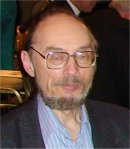|
|
|
Plenary Lecture
Mathematical Theory of Information Technology

Professor Mark Burgin
Visiting Scholar
UCLA, USA
E-mail: mburgin@math.ucla.edu
Abstract: It is possible to consider computation, communication and
networking on three levels. The first level indicates what is done in a
computational/communication process or in a process in a network. From this
perspective, processes are represented as sequences of events or actions.
The mathematical theory that studies processes on this level is process
algebra.
The second level tells us not only what is done in a
computational/communication process or in a process in a network but also
how it is done. From this perspective, processes are represented by
algorithms, programs, and scenarios. The major mathematical theory that
studies processes on this level is the theory of algorithms.
The third level of process description explains us not only what is done in
a process and how it is done but also with what means everything is
performed in the process. From this perspective, processes are represented
by technologies. The major mathematical theory that studies processes on
this level is the mathematical theory of technology. This theory has
developed a general mathematical model of technology and technological
processes, as well as a relevant mathematical apparatus and exact methods
for an investigation and design of various technologies (in computation,
computer and network industry, management, information processing,
education, and so on).
The mathematical theory of technology utilizes new mathematical disciplines
such as theory of named sets, fuzzy set theory, and theory of structured
multidimensional models of systems and processes as well as traditional
fields such as algebra, theory of probabilities, and theory of algorithms.
In the mathematical theory of information technology such problems as
reliability, equivalence, stability, constructibility, and realizability of
information technologies are studied. The aim is the development of
efficient methods and algorithms of the computer aided design of information
technologies. In the lecture, elements of the mathematical theory of
technology will be exposed and it will be demonstrated how this theory can
help in solving problems of information technology.
Brief Biography of the Speaker:
Dr. Mark Burgin received his M.A. and Ph.D. in mathematics from Moscow State
University and Doctor of Science in logic and philosophy from the National
Academy of Sciences of Ukraine. He is currently a Visiting Scholar at UCLA,
USA. Previously he was a Professor at Institute of Education, Kiev; at
International Solomon University, Kiev; at Kiev State University, Ukraine;
and Director of the Assessment Laboratory in the Research Center of Science
at the National Academy of Sciences of Ukraine. Dr. Burgin is a member of
New York Academy of Sciences and an Honorary Professor of the Aerospace
Academy of Ukraine. He is a Chief Editor of the journal Integration and
Associate Editor of the International Journal on Computers and their
Applications. Dr. Burgin is a member of the Science Advisory Committee at
Science of Information Institute, Washington. He was a member of organizing
and program committees of more than 30 conferences. He also organized and
directed several ongoing research seminars in mathematics and computer
science, such as Theoretical Computer Science (UCLA), Foundations of
Mathematics and Information Sciences (National Academy of Sciences of
Ukraine) and Creativity in Education (Ministry of Education of Ukraine). Dr.
Burgin is doing research, has publications, and taught courses in
mathematics, computer science, information sciences, system theory,
artificial intelligence, software engineering, logic, psychology, education,
social sciences, and methodology of science. He originated such theories as
the mathematical theory of technology, system theory of time, general
information theory, theory of named sets, and neoclassical analysis (in
mathematics) and made essential contributions to such fields as foundations
of mathematics, theory of algorithms, theory of knowledge, theory of
intellectual activity, and complexity studies. His practical experience
includes design of operating systems for supercomputers, CAD systems for
electrical engineering and problem oriented languages for such systems,
databases for biological information, and general expert systems, as well as
mathematical modeling databases and expert systems. Dr. Burgin has
authorized and co-authorized more than 500 papers and 17 books, including
“Neoclassical Analysis: Calculus Closer to the Real World” (2008),
“Super-recursive Algorithms” (2005), “On the Nature and Essence of
Mathematics” (1998), “Intellectual Components of Creativity” (1998),
“Fundamental Structures of Knowledge and Information” (1997), “Introduction
to the Modern Exact Methodology of Science“ (1994), “The
Structure-Nominative Analysis of Theoretical Knowledge (1992), and “The
World of Theories and Power of Mind” (1992).
|
|
|